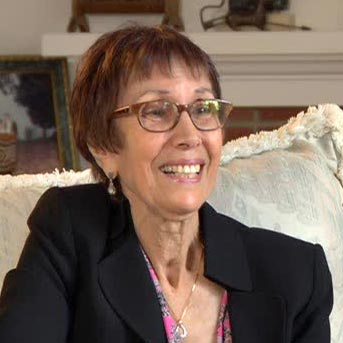
Ruth Pearl
Ruth Pearl is best known as the mother of late American journalist Daniel Pearl, the Wall Street Journal’s South Asia Bureau Chief, who was kidnapped and murdered in Pakistan by terrorists in 2002. But it is her own life story that is preserved as part of USC Shoah Foundation’s new collection of testimonies from North Africa and the Middle East.
Pearl recorded her testimony in 2014, interviewed by the collection’s project director Jacqueline Gmach. The collection aims to preserve the life stories of Jews who lived in North Africa or the Middle East before, during and after World War II, when Jews in the region were subjected to deportation, imprisonment in concentration camps, and the destruction of their homes, as well as severe anti-Semitism and anti-Jewish laws from their own governments.
So far, about half a dozen testimonies have been taken, with the goal of recording 50 initial testimonies.
Pearl was born in Baghdad in 1935. In June 1941 she witnessed the Farhud – an attack on Jewish homes and businesses in Iraq in which hundreds were killed or wounded – and later spent time in a refugee camp in Israel. She served in the Israeli Navy and attended the Technion – Israel Institute of Technology. She, her husband, Judea, and daughters Tamara and Michelle established the Daniel Pearl Foundation in 2002 to continue Daniel's life work of connecting diverse people around their common humanity through journalism, music and dialogue. An unconventional optimist, Daniel Pearl earned respect around the world as a fair and highly-principled journalist and bridge-builder, who traveled with his violin and mandolin, using words and music to bring people together.
Pearl said she wanted to give testimony to the USC Shoah Foundation because the story of Jews in Arab lands is not very well-known, even though they lived as Jewish refugees after the Holocaust; in similar refugee camps as that of the Palestinian refugees.
“The only difference is that we stayed for a limited time in the Ma’abarot [refugee camps] while the Palestinians and their descendants were forced to stay as refugees for generations,” Pearl said.
She noted she had the “good fortune to be able to tell this to President George W. Bush in December of 2007, at a Human Rights meeting at the White House” and that he was interested to learn about the contrasting experiences of Jews and Palestinians in the Middle East after World War II. A couple of months later, the President mentioned the plight of the Jews of Iraq, as published in a Jerusalem Post article.
It’s important for the testimonies of Jews from North Africa and the Middle East to be preserved because their “coordinated expulsion” after the Holocaust was not documented adequately, she believes.
“The fact is that close to a million Jews from ten Arab countries, who predated Islam by more than a millennium, were simultaneously expelled from their homes and not many know about it. It is time to thoroughly document this for history,” Pearl said.
She added that testimonies must be recorded now before the witnesses are gone and denial can set in, as it has for the Holocaust.
“The denial of the Holocaust is rampant, even though it is thoroughly documented and the story of the Jews from the Arabs countries was not even told,” she said. “It is urgent to do so now while we still have eyewitness testimonials.”